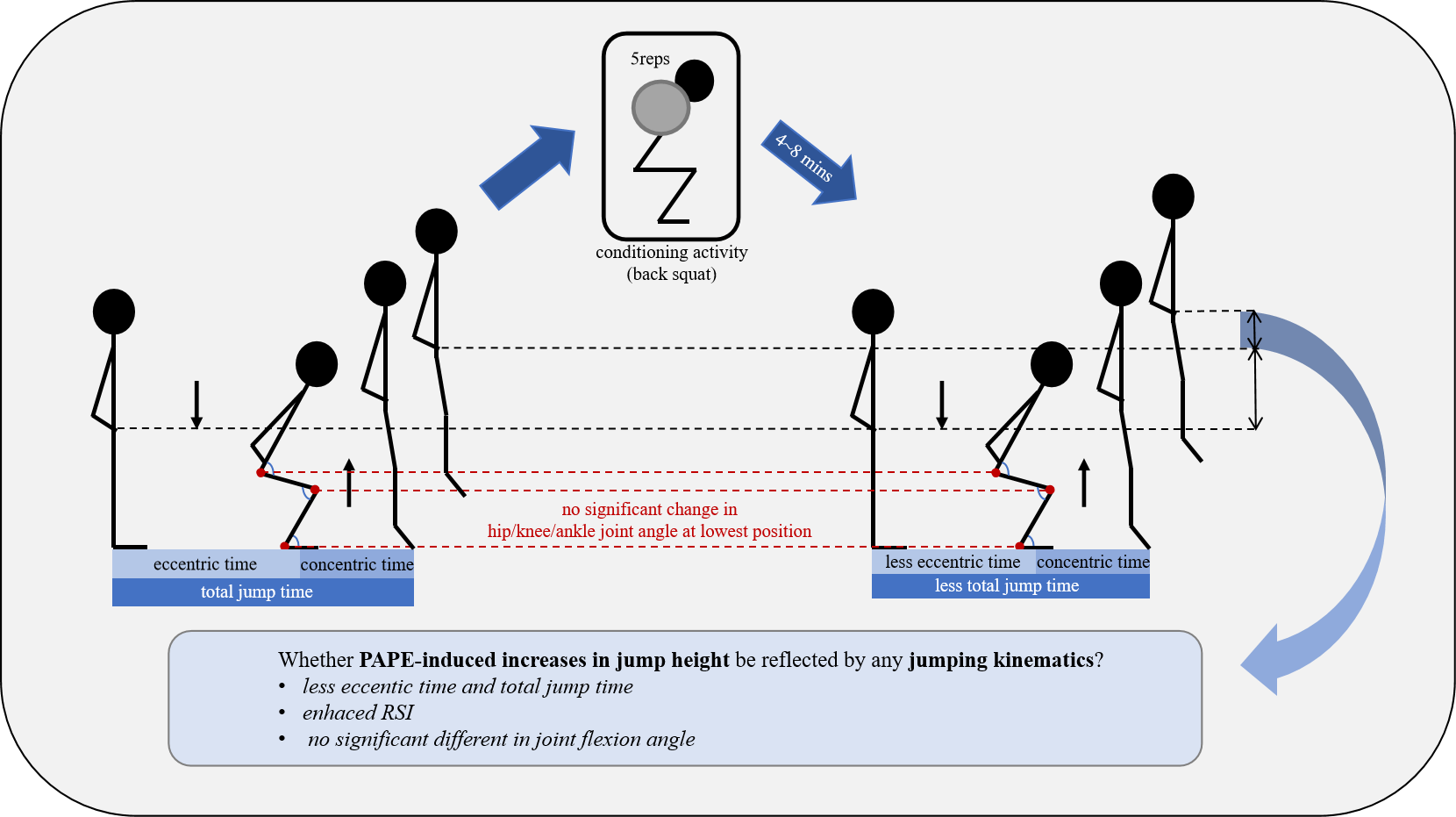 Open Access
Open Access
ARTICLE
Can PAPE-Induced Increases in Jump Height Be Explained by Jumping Kinematics?
1 Faculty of Sports Science, Ningbo University, Ningbo, 315211, China
2 Centre for Health and Exercise Science Research, Hong Kong Baptist University, Kowloon Tong, Hong Kong, China
3 Department of Radiology, Ningbo No. 2 Hospital, Ningbo, 315010, China
* Corresponding Author: Yaodong Gu. Email:
Molecular & Cellular Biomechanics 2023, 20(2), 67-79. https://doi.org/10.32604/mcb.2023.042910
Received 16 June 2023; Accepted 22 August 2023; Issue published 01 November 2023
Abstract
The aim of this study was to investigate whether kinematic data during a countermovement jump (CMJ) could explain the post-activation performance enhancement (PAPE) effects following acute resistance exercise. Twenty-four male participants with resistance training and jumping experience were recruited and randomly assigned to either the experimental group (PAPE-stimulus) (n = 12) or the control group (n = 12). In the experimental group, participants performed 5 reps of squats at 80% 1RM to induce PAPE, while the control group received no intervention. Both groups performed three CMJ tests before (PRE) and at immediate (POST0), 4 (POST4), 8 (POST8), and 12 (POST12) min after the intervention, with kinematic data recorded during the CMJ. Kinematic parameters analyzed in this study included jump height, hip-knee-ankle flexion angles at the lowest position of the countermovement, eccentric and concentric time durations, and the temporal changes of hip-knee-ankle flexion angles during the entire jumping phase. The presence of PAPE was determined by the change in jump height. The results showed that in the experimental group, jump height significantly increased at POST4 (p < 0.001) and POST8 (p < 0.001) and significantly decreased at POST0 (p = 0.008), with no significant change at POST12. The control group showed no significant changes at any measured time point. Kinematic parameters showed that there was no significant difference in joint flexion angle of the lower body during the CMJ between pre- and post-intervention, regardless of PAPE or fatigue. However, eccentric time significantly decreased at 4 and 8 min (p = 0.013 and p = 0.001, respectively) after the intervention. These findings suggest that PAPE-induced increases in jump height after acute resistance exercise can be attributed to the decrease in eccentric phase duration, but not joint flexion angle. Additionally, the fatigue-induced decrease in jump height cannot be reflected by jumping kinematics. Based on these findings, coaches may use complex training to utilize the PAPE effects to increase jump height while reducing the eccentric time during vertical jumps. This method can enhance an athlete’s eccentric ability to generate force in a short amount of time which is crucial for performance enhancement.
Graphic Abstract

Keywords
Cite This Article
 Copyright © 2023 The Author(s). Published by Tech Science Press.
Copyright © 2023 The Author(s). Published by Tech Science Press.This work is licensed under a Creative Commons Attribution 4.0 International License , which permits unrestricted use, distribution, and reproduction in any medium, provided the original work is properly cited.


 View Full Text
View Full Text Download PDF
Download PDF Downloads
Downloads
 Citation Tools
Citation Tools